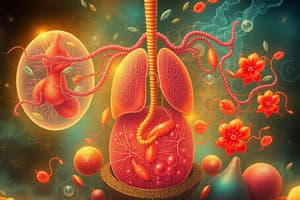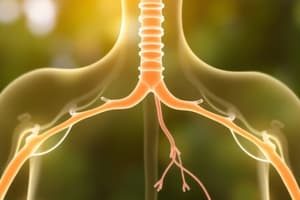Podcast
Questions and Answers
What is the smallest structural and functional unit of an organism?
What is the smallest structural and functional unit of an organism?
- Organ
- Tissue
- Organism
- Cell (correct)
Anaerobic respiration occurs with the use of oxygen.
Anaerobic respiration occurs with the use of oxygen.
False (B)
What is the process called where food is broken down in the cell to release energy?
What is the process called where food is broken down in the cell to release energy?
cellular respiration
During aerobic respiration, glucose is broken down into carbon dioxide and water along with ______.
During aerobic respiration, glucose is broken down into carbon dioxide and water along with ______.
Match the following types of respiration with their characteristics:
Match the following types of respiration with their characteristics:
Flashcards
Cellular Respiration
Cellular Respiration
The process by which cells break down food to release energy. It occurs in all living organisms.
Aerobic Respiration
Aerobic Respiration
Cellular respiration that requires oxygen. It breaks down glucose into carbon dioxide, water, and energy.
Anaerobic Respiration
Anaerobic Respiration
Cellular respiration that doesn't require oxygen. It breaks down glucose into alcohol, carbon dioxide, and energy.
Anaerobes
Anaerobes
Signup and view all the flashcards
Glucose
Glucose
Signup and view all the flashcards
Study Notes
Cellular Respiration
- All organisms are composed of cells, the smallest structural and functional units.
- Cells perform various functions, including nutrition, transport, excretion, and reproduction, all requiring energy.
- Food stores energy released during respiration.
- Organisms respire to obtain energy from food.
- During respiration, organisms breathe in oxygen-rich air and breathe out carbon dioxide-rich air.
- Air is transported to cells where oxygen helps break down food.
- Cellular respiration is the process of food breakdown in cells, releasing energy.
- This process occurs in all cells.
- Aerobic respiration uses oxygen; glucose is broken down into carbon dioxide, water, and energy.
- Anaerobic respiration occurs without oxygen; glucose is broken down into alcohol, carbon dioxide, and energy.
- Some organisms, like yeast, are anaerobes and survive without oxygen through anaerobic respiration.
Studying That Suits You
Use AI to generate personalized quizzes and flashcards to suit your learning preferences.



